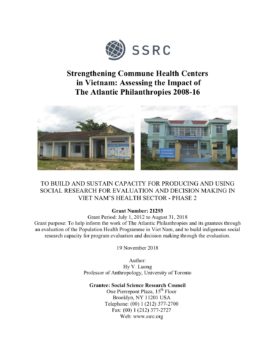Strengthening Commune Health Centers in Vietnam
Resource type: Research Report
Hy V. Luong, University of Toronto |
Vietnamese Version
This report assesses the impact of investments in rural health care in Viet Nam by The Atlantic Philanthropies, the Vietnamese government, and other international donors. It is based on a large-scale longitudinal study from 2008 to 2016 in twelve communes in three Vietnamese provinces: Thái Nguyên in the north, Khánh Hòa in the central coast, and Vĩnh Long in the southern Mekong delta. The study was conducted by the Vietnam Academy of Social Sciences (VASS) and the Social Science Research Council (SSRC).
Commune Health Centers (CHCs) form the grassroots public health care system in rural Viet Nam, where two-thirds of the country’s people live. The centers provide basic preventive care along with initial diagnoses, treatments, and referrals to public hospitals.
Insights from the report include:
- The ability of CHCs to attract patients depended as much on CHC leadership and management as it did on the investments in physical infrastructure, high-tech equipment, and staff expertise.
- Among different types of investments in CHCs, the program in maternal and child health had a greater positive impact on patients’ choices of CHCs over other health care providers for acute and chronic illnesses.
- Government policy should allow for greater flexibility in the CHC model, including more local initiatives and differentiating models of CHCs for different parts of the country.
Learn More
- Policy Roundtable: “Improving the Quality of Health Care at the Grassroots Level in Viet Nam”
- Related Publications from the Social Science Research Council
Related Reports
These related reports provide more insight on commune health centers in Viet Nam.
- What Makes for an Effective Commune Health Center?
- Working Toward a Healthy Vietnam: Key Policy Messages From the VASS-SSRC Project
- Fact Sheet – Longitudinal Study of Population Health in Three Vietnamese Provinces (PDF)
- Analysis of Self-Reported Health in Commune Health Centers: A Case Study in Thai Nguyen, Khanh Hoa and Vinh Long Provinces (PDF) | Phân tích Tự Đánh giá Sức Khỏe tại các Trạm Y Tế Nghiên Cứu Trường Hợp ở các tỉnh Thái Nguyên, Khánh Hòa và Vĩnh Long (Vietnamese Version | PDF)
Social Science Research Council is an Atlantic grantee. Atlantic commissioned this report.
